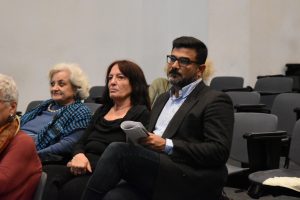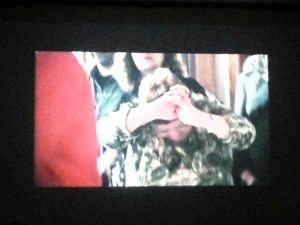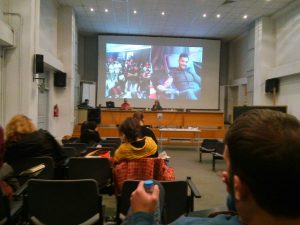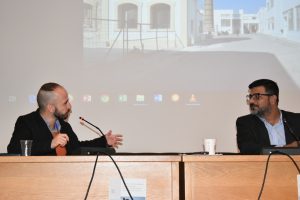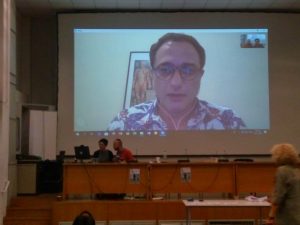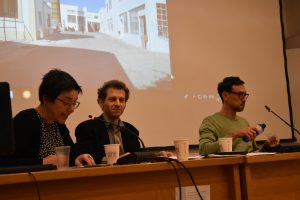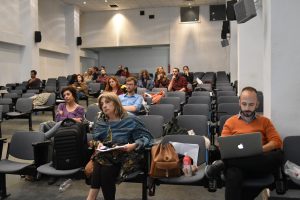Summary of the Research Proposal
The research examines the ritual of Ashura, as it is performed by the Pakistani Shia community in Piraeus. Ashura is the day of mourning for the martyrdom of Imam Husayn: the Prophet’s grandson and 3rd Imam who led a revolt against the Omayyad caliph Yazid A, and was finally beheaded in the battle of Karbala in 680 AD. This battle provides the central narrative around which Shia Muslims construct their political identity as migrants and their religious identification as a minority vis-à-vis Sunni Muslims in Greece. Ashura is commemorated every year through rituals of lamentation and public processions that include, in some cases, self-flagellation.
A decontextualized focus on the act of self-flagellation, over-accentuated by the mass media, reinforces local stereotypes of the Shia community practices as ‘incompatible’ with Greek cultural values. Social representations of the Shiite as ‘barbaric Others’ are frequently evoked in public debate in order to support Islamophobic and racialised narratives of anti-cosmopolitanism. However, confronted with xenophobia and social estrangement, the Shiite systematically attempt to articulate counter-narratives of ‘cultural intimacy’ (Herzfeld 2005) that stress the similarities between their ritual lament and various embodied performances of faith from the Greek cultural context, such as the Tinos pilgrimage (Dubisch 1996) or the Anastenaria (Danforth 1989).
The proposed research has a threefold purpose. First, it documents the community’s political struggle to promote discursively and practically a multicultural vision of citizenship based on embodied and affective components of subjectivity. Second, it unravels the rich meta-symbolic character the Ashura assumes in a migratory context, becoming an idiom or expressing and negotiating feelings of loss associated with migration trajectories. Third, departing from the case of the Ashura, but also opening-up the research focus through other examples of performances of lament, it examines how the claim to cultural intimacy is re-articulated in contemporary artistic practices, focusing on the performing arts.
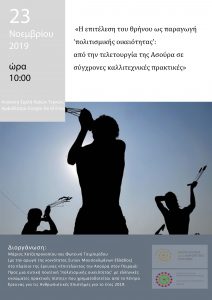 Symposium
Symposium
“The performance of lament as production of ‘cultural intimacy’: from the ritual of Ashura to contemporary artistic practices”.
Athens School of Fine Arts, Giorgio DeChirico Auditorium
Saturday, November 23rd 2019
The research project “Performing Ashura in Piraeus: Towards a Shiite poetics of ‘cultural intimacy’ with Greek embodied practices of religiosity” was funded by RCH for the year 2019.
Co-organization with Cultures Borders Gender Laboratory http://cbg-lab.uom.gr/en/ 
Programme
10:00 Welcome and introduction
10:15-11:30 1st panel [language: Greek] The performance of lament as production of ‘cultural intimacy’: from Ashura to Anastenaria.
Moderator: Foteini Tsibiridou
10:15-10:30 Foteini Tsibiridou (University of Macedonia)
Mourning and lament as practices of religious faith in the Eastern Mediterranean: from popular beliefs to the practice of cultural intimacy
10:30-10:45 Miranda Terzopoulou (Academy of Athens)
Turing the immaterial and invisible of the myths to the visible and apocalyptic of the present: gendered asymmetries in rituals of lamentation
10:45-11:00 Marios Chatziprokoiou (University of Macedonia/ University of Thessaly)
Between the politics of difference and the poetics of ‘cultural intimacy’: performing Ashura in Piraeus
11:00-11:30 Discussion
11:30-11:45 Break
11:45-13:00 2nd panel [language: Greek] Images of the Ashura in Greece: photography, television, documentary
Moderator: Miranda Terzopoulou
11:45-12:00 Ashir Haider (journalist, representative of Pakistani Muslim Association in Greece)
Ashura and Shiite visibility in the city of Athens: a perspective ‘from within’
12:00-12:15 Tasos Vrettos (photographer)
Τo give body
12:15-12:30 Elpida Skoufalou (filmmaker)
Rituals: another role
12:30-13:00 Discussion
13:00-14:00 Lunch Break
14:00-14:25 Film screening
Ashura (24΄, Köken Ergun, 2013)
14:25-15:40 3rd panel [language: English] From ritual lament to contemporary art: the ethnographer as perfomer
Moderator: Vassiliki Lalioti (NKUA)
14:25-14:40 Köken Ergun (Freie Universitat Berlin)
Ashura Rituals in Istanbul’s Zeynebiye Neighborhood
14:40-14:55 Sinibaldo de Rosa (Exeter University)
Ritual, Performance and Commemoration in Alevi contexts
14:55-15:10 Bernard Muller (EHESS/ Cologne)
Ritual and Reenactment: Performance as vehicle for Research and anthropology as medium for social acknowledgment
15:10-15:40 Discussion
15:40-16:00 Break
16:00-16:45 Keynote, Jalal Toufic (Hong Kong Baptist University)
‘Āshūrā’; or, Torturous Memory as a Condition of Possibility of an Unconditional Promise
Discussant: Vassiliki Lalioti
16:45-17:45 Film screening
The Lamentation Series: the Ninth Night and Day (60΄, Jalal Toufic 2005)
17:45-18:00 Break
18:00-19:30 4th panel [language: Greeκ] Practices of faith as performative material: the performer as ethnographer
Moderator: Marios Chatziprokopiou
18:00-18:15 Eva Giannakopoulou (visual artist/ performer)
Feminities and cults, performative practices and recording
18:15-18:30 Yannis Pappas (Visual artist/ performer)
Spatial Ataraxia
18:30-18:45 Konstantinos Ntellas (actor/ director)
Tackling mourning at the performative space: rituals of lament as a stage function
18:45-19:15 Discussion
19:15-19:30 Βreak
19:30-21:00 Film screening
‘I heard God crying’ (86΄, Elpida Skoufalou 2010)
Conference Poster (JPG)
Conference Programme (PDF)
Research: “Performing Ashura in Piraeus: Towards a Shiite Poetics of “Cultural Intimacy” with Greek Embodied Practices of Religiosity”
Research Group: Marios Chatziprokopiou, Fotini Tsibiridou
The research project “Performing Ashura in Piraeus: Towards a Shiite Poetics of “Cultural Intimacy” with Greek Embodied Practices of Religiosity” was funded by the Research Centre for the Humanities (RCH) for the year 2019.
This one-year research project (2019) explored the religious lament of the Ashura[1] as it is performed by the Pakistani Shia community in Piraeus. With their focus on the act of ritual self-flagellation, mainstream media reinforce local stereotypes of Shia community practices as apparently incompatible with Greek cultural values. Social representations of the Shiite as ‘barbaric Others’ are frequently evoked in public debate in order to support anti-cosmopolitan narratives that are Islamophobic and racialised. Confronted with such xenophobia and social estrangement, the Shiite attempt to articulate systematic counter-narratives of ‘cultural intimacy’ (Herzfeld 2005). They stress the similarities between their ritual lament and various embodied performances of faith from within the Greek cultural context, such as the Tinos pilgrimage (Dubisch 1996) or the Anastenaria (Danforth 1989).
Combining archival research focusing on the reception of the Ashura in the local context (textual and visual analysis of relevant television programmes, articles in the press, websites, photographic exhibitions and art documentaries), and ethnographic fieldwork among the Shiite community in Piraeus during one calendar year (2019) valorizing a performative ethos of participant observation (Conquergood 2002: 149), the research project documented the community’s political struggle to promote, both discursively and practically, a multicultural vision of citizenship that is based on the embodied and affective aspects of subjectivity. At the same time, it explored the rich meta-symbolic character that the Ashura assumes in a migratory context, where it becomes an idiom or a means of expressing and negotiating feelings of loss associated with the experience of displacement. Moving beyond the case of the Ashura, the project further broadened the research focus by including examples of other performances of lament, in order to examine how the claim to ‘cultural intimacy’ is re-articulated in diverse contemporary artistic practices: from photography and documentary to performance.
A milestone of this research project was the one-day international symposium ‘The Performance of Lament as Production of “Cultural Intimacy”: From the Ritual of Ashura to Contemporary Artistic Practices’ (Athens School of Fine Arts, 23.11.2019). Putting together diverse perspectives and research by artists and anthropologists who commented on the performativity of faith in public space and its impact on the field of art, the symposium raised ethico-political issues in relation to fieldwork research, and reframed the concept of ‘cultural intimacy’ in contemporary environments of heterogeneity. In addition, the symposium explored the ways in which the performance of Shiite lament can be related to other embodied practices of religiosity in Greece such as, for instance, the Anastenaria. Further, it investigated how Shiite lament is visually recorded beyond the limits of televisual lenses, inspiring major photographic and cinematographic works in the Eastern Mediterranean (for example in Greece, Turkey and Lebanon). Finally, taking this ritual as a point of departure, the symposium raised questions regarding the connections between religious rituals and artistic performances, and in this way problematised, both methodologically and epistemologically, the mutual relations between ethnographic and artistic research.
[1] Ashura is the day of mourning for the martyrdom of Imam Husayn, the Prophet’s grandson and 3rd Imam. Imam Husayn led a revolt against the Omayyad Caliph Yazid A, and was finally beheaded in the battle of Karbala in 680 AD. This battle provides the central narrative around which Shia Muslims construct their political identity as migrants and their religious identification as a minority vis-à-vis Sunni Muslims in Greece. Ashura is commemorated every year through rituals of lamentation and public processions that include, in some cases, selfflagellation.
The full academic report for this research’s results is available in Greek. To view it, click here and browse to the tab “Αποτελέσματα Έρευνας”.

Marios Chatziprokopiou studied history and theatre in Thessaloniki and visual arts in Paris. He earned his M.A. in social anthropology (Ecole des Hautes Etudes en Sciences Sociales de Paris), funded by the French government and the Michelis Foundation, and his PhD in theatre and performance Studies (Aberystwyth University), funded by the Doctoral Career Development Scholarship. He teaches contemporary theories of theatre and drama at the University of Patras (2018-9, first semester) and he has taught courses of anthropology, theatre and performance at the Federal University of Bahia, Aberystwyth University, and Panteion University. His articles appear in international edited volumes and peer-reviewed journals. His research and teaching interests focus on performances of migration and refugeeness, contemporary re-readings of ancient drama, performances of gender and sexuality, ritual performances of lament (emphasizing on Shia Islam), and on the interrelations between religious ritual and artistic practice.

Fotini Tsibiridou is Professor of Social Anthropology (University of Macedonia, department of Balkan, Slavic and Oriental Studies). Ex-Director of the MA program (2013- 2018): “History, Anthropology and Culture in Eastern and South-Eastern Europe” (University of Macedonia-Thessaloniki), Academic staff of the Democritus University of Thrace 1992-2003.
She holds a PhD and an MA from the Ecole des Hautes Etudes en Sciences Sociales (1990), Graduated Studies in French literature (Aristotle University of Thessaloniki), Academic Scholar at EHESS-Paris (1996), Harvard MA (1999), Bilgi-Istanbul (2008), Mimar Sinan University (2015-16).
Her research interests focus on political anthropology, Islam and gender (ethnic minorities, Islam, nationalisms, state culture and citizenship, urban ethnography, gender, power and social movements). She has conducted ethnographic fieldwork in Greece, Turkey and the Middle East (The Sultanate of Oman).
Selected Publications
- Chatziprokopiou, Marios, ‘Queering the archive of Greek laments’, Journal of Greek Media & Culture, forthcoming spring 2019.
- Chatziprokopiou, Marios, ‘Hosting the lament(s) of Others? Tensions and antinomies in Dries Verhoeven’s No Man’s Land’, Journal of Greek Media & Culture, 3:2, pp. 161–176, 2017.
- Chatziprokopiou, Marios and Hatziprokopiou, Panos, ‘Between the poetics of difference and the politics of similarity: Performing Ashura in Piraeus’, Journal of Muslims in Europe, 6:2, pp. 1- 19, 2017.
- Chatziprokopiou, Marios, ‘Lamenting (with the) “Others”, “Lamenting our Failure to Lament”? An auto-ethnographic account of the vocal expression of loss,’ in Voice Studies: Critical Approaches to Process, Performance and Experience (Ed. by Ben Macpherson and Konstantinos Thomaidis), Routledge, London and New York, 2015.
- Chatziprokopiou, Marios and Kear, Adrian, ‘Mourning’ (dictionary entry), in Vocabulary for the Study of Religion (VSR), Brill, 2015.
- Chatziprokopiou, Marios, ‘24 Juillet 1967: La reconstitution imaginaire d’une soirée du 4em workshop de la libre expression’. in Lebel, Jean-Jacques et Michaël, Androula, Les happenings de Jean-Jacques Lebel, ou l’insoumission radicale, Paris: Hazan, pp. 202-21, 2009.
- Tsibiridou & D. Stamatopoulos (2008) Orientalism at the limits. From the Ottoman Balkans to the Contemporary Middle East. Athens: Kritiki [in Greek].
- Tsibiridou & N. Palantzas (eds) (2013) Myths of the Other in the Balkans. Representations, Social Practices, Performances. Thessaloniki: (eBook ISBN 978-960-8096-05-9) http://online.anyflip.com/wiwn/vglf/mobile/index.html
- Deltsou and F. Tsibiridou (guest editors), Semiotics and Fieldwork: On Critical Ethnographies, Punctum. International journal of semiotics 2:2 December 2016 file:///C:/Users/user/Downloads/Punctum22-forweb-v1.pdf
- Deltsou and F. Tsibiridou (guest editors) (2017), “Introduction” and eds Urban lives and protests in neoliberal times: Art, aesthetics and solidarity as possibilities. The Greek Journal of Social Research (special issue 149 B/) https://ejournals.epublishing.ekt.gr/index.php/ekke
- Tsibiridou and M. Bartsidis, “‘Dignity’ as glocal civic virtue: Redefining democracy in the era of neoliberal governmentality”, στο Sabah Alnasseri (ed.) Arab Revolutions and Beyond, New York: Macmillan-Palgrave 2016: 31-54.
- Tsibiridou (2016) “Dissemination paper on NATIONLESS project”, NATIONLESS, Artan Sadiku and Gjorgje Jovanovik (eds), Institute of Social Sciences and Humanities-Skopje: 26-38. http://nationlessproject.weebly.com/publication.html
- Deltsou and F. Tsibiridou (guest editors), Introduction – Semiotics and Fieldwork: On Critical Ethnographies, Punctum. International journal of semiotics 2:2 (pp. 5-13) December 2016
- Tsibiridou (2018). “An Ethnography of Space, Creative Dissent and Reflective Nostalgia in the City Centre of Global Istanbul”, in Pardo, I. and Prato, G. (eds) The Palgrave Handbook of Urban Ethnography (pp. 405-426). Palgrave-Macmillan.
- Τsibiridou, Fotini (2017) “Creativity, Counterpublics and Çapulcu [looters] Cosmopolitics in Beyoǧlu (Istanbul)”, in E. Deltsou and F. Tsibiridou (guest editors), Urban lives and protests in neoliberal times: Art, aesthetics and solidarity as possibilities. The Greek Journal of Social Research (special issue, 149 B/) https://ejournals.epublishing.ekt.gr/index.php/ekke/article/view/15815
- Φ. Τσιμπιρίδου (2018) «Η πατριαρχία ως αιχμαλωσία στη μετασοβιετική εποχή: βότκα ανδρισμός επί της οθόνης και θυμωμένες φεμινίστριες στην κάμερα», Φεμινιστιqα, τεύχος 1 http://feministiqa.net/i-patriarxia-os-aixmalosia-sti-metan/

